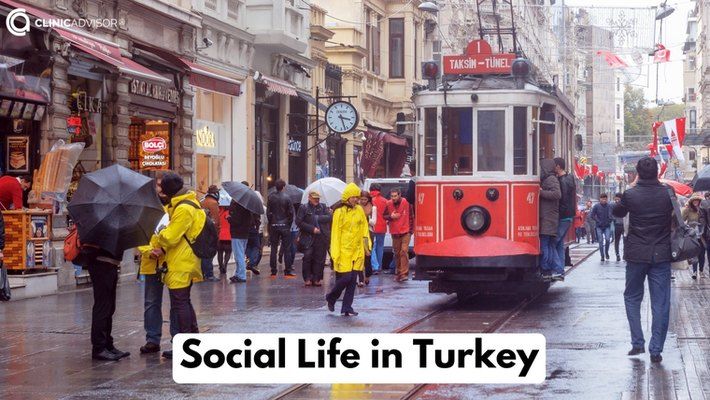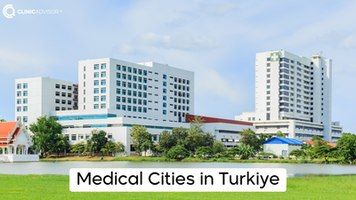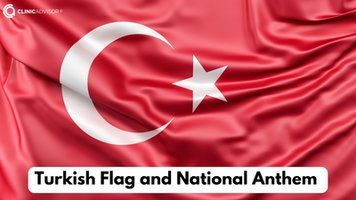Social life in Turkiye is characterized by a deep sense of hospitality, family and social cohesion, and celebration.
Turkish people have a deep respect for their traditions, culture, and history, which is clearly reflected in their social life. Their hospitality is legendary, and the emphasis on community and family ties is central to Turkish society.
Clinic Advisor is a well-established agency that facilitates the procedures for requesting treatment in Turkiye for individuals who wish to come to Turkiye for treatment and provides many medical and cosmetic services such as hair transplantation in Turkiye.
What are the living conditions like in Turkiye?
Turkiye, with its unique geographical location, offers a blend of Eastern and Western cultures. Living conditions in Turkiye vary, with urban areas offering a modern, high-quality lifestyle, while rural areas reflect a simpler, traditional lifestyle. According to Numbeo 2022 data, Turkiye ranks 50th in the global quality of life ranking.
What is daily life like in Turkiye?
Daily life in Turkiye is influenced by a mixture of modern and traditional cultures. In urban areas, you'll find cities bustling with shopping, entertainment, and a vibrant culinary scene. Life in rural areas revolves around agriculture and traditional customs. Turkish people are known for their hospitality and warmth, where family and community are central to daily life.
Is life expensive in Turkiye?
The cost of living in Turkiye is relatively lower compared to many European Union countries. Expenses vary greatly between cities and rural areas. Istanbul, for example, is relatively more expensive than smaller cities and rural areas. According to Numbeo, monthly costs per person without rent in Istanbul are around 11,544 TL (about 571 USD as of May 2023).
What does the architecture of Turkiye look like and what is the structure of the city?
Turkiye is proud of its rich architectural heritage that reflects its diverse history. Turkish architecture ranges from Roman, Byzantine, and Ottoman structures to modern and contemporary designs. Istanbul, the largest city in Turkiye, is famous for buildings such as Hagia Sophia, Blue Mosque, and Topkapi Palace. In terms of city structure, major cities such as Istanbul, Ankara, and Izmir consist of high-rise residential areas and crowded commercial areas.
What are the must-see historical places in Turkiye?
Turkiye has a long history, with several UNESCO World Heritage Sites. Highlights include Hagia Sophia, Topkapi Palace, the ancient city of Ephesus, the megalithic sites of Cappadocia and Pamukkale, and the archaeological site of Troy, among others.
What is rural life like in Turkiye?
Village life in Turkiye is relatively simple and closely linked to the land. Villages are often centered around agriculture, with locals growing their own food and raising livestock. Traditions and customs are highly respected, with many villages still practicing trades and crafts that have been passed down through generations.
What are the transportation options in Turkiye?
Turkiye has a comprehensive transportation system, with an extensive network of buses, metro, and trams in urban areas. Intercity transportation is facilitated by state-of-the-art high-speed trains, intercity buses, and domestic flights. Istanbul and Izmir also have ferry services as part of their urban transport networks.
How to move between cities in Turkiye?
Turkiye has a comprehensive intercity transportation network that includes high-speed trains, long-distance buses, and domestic flights. Turkish State Railways operates high-speed rail services connecting major cities, while several bus companies operate comprehensive routes throughout the country.
Is there traffic congestion in Turkiye?
Traffic congestion can be significant in large cities such as Istanbul, Ankara, and Izmir, especially during peak hours. However, many cities have begun to develop more comprehensive public transportation systems to ease traffic.
What is required to drive in Turkiye?
Foreigners can use their local driving license for six months in Turkiye. After that, they must obtain a Turkish driving license. To obtain a Turkish driving license, foreigners must submit the necessary documents and pass a theoretical and practical driving test.
What is education like in Turkiye?
Education is compulsory in Turkiye from the age of 6 to 14 years. The country has both public and private schools, with many universities offering a wide range of undergraduate and postgraduate programs. Some of the best universities in Turkiye include Istanbul University, Boğaziçi University, Middle East Technical University, and Koç University.
How is the economy in Turkiye?
Turkiye has a mixed economy with a strong private sector. It is the twentieth economy in the world in terms of GDP. Key sectors include automobiles, petrochemicals, electronics, textiles, agriculture and tourism.
What are the tax rates in Turkiye?
Turkiye uses a progressive tax system where the tax rate is proportional to taxable income. Most employees in Turkiye have their taxes deducted from their monthly salaries by their employers. However, for those who are self-employed or run their own business, an annual tax return becomes mandatory.
Tax rate in Turkiye for the year 2023: up to 70,000 Turkish liras, the tax rate is 15%. And 10,500 Turkish liras compared to 70,000 Turkish liras, with a weight of 150,000 Turkish liras, the tax rate is 20%. And 26,500 Turkish Liras compared to 150,000 Turkish Liras out of 370,000 Turkish Liras (26,500 Turkish Liras compared to 150,000 Turkish Liras out of 550,000 Turkish Liras in wage income), the excess tax rate is 27%.
How is working life in Turkiye?
Working life in Turkiye is vibrant and full of opportunities. Average working hours in Turkiye range between 40-45 hours per week and are strictly regulated - not exceeding 11 hours per day and 66 hours per week. Most people in Turkiye work an average of 8-9 hours a day, with an hour lunch break.
If an employee works beyond average hours, they will usually be compensated with additional pay or additional time off. The labor force participation rate in Turkiye is about 51% for women and 72% for men.
How is the climate in Turkiye?
Turkiye enjoys diverse climatic conditions due to its vast geography. The coastal areas have a Mediterranean climate with hot summers and mild winters. Central Anatolia has a more continental climate with cold winters and hot summers, while Eastern Anatolia can have harsh winters.
What is the geography of Turkiye?
Turkiye is a transcontinental country extending along Southeastern Europe and Western Asia. It is bordered by eight countries and surrounded by three different seas: the Aegean Sea to the west, the Black Sea to the north, and the Mediterranean Sea to the south. The country's diverse geography includes mountains, plateaus, and coastal plains.
What is the social structure of Turkiye?
The social structure in Turkiye is diverse, with a society consisting of different cultural, ethnic, and religious groups. The majority of the population are Turks, followed by Kurds. The family plays a central role in Turkish society, and respect for the elderly is strongly rooted in Turkish culture.
What is the nightlife like in Turkiye?
Nightlife in Turkiye, especially in Istanbul, is vibrant and diverse. From traditional bars to modern nightclubs featuring international DJs, Turkiye has something for everyone. Istanbul, Izmir, and Antalya are famous for their nightlife scenes.
What is nightlife like in Istanbul, Turkiye?
Istanbul's nightlife is famous for its diversity. The city offers a range of options from traditional rooftop bars and concert venues. Beyoğlu area, especially Istiklal Street and its surrounding neighborhoods, is famous for its vibrant nightlife.
Is there a ban on abortion in Turkiye?
Abortion is legal in Turkiye until the tenth week of pregnancy. However, access can vary by region and hospital.
Is there racism in Turkiye?
Like any country, experiences vary. While many foreigners report warm and welcoming experiences, incidents of racism or discrimination can occur. The government officially promotes a policy of multiculturalism and tolerance.
How is the life of Turks in Turkiye?
The lifestyle of Turks in Turkiye is influenced by a mixture of modern and traditional influences. Turkish people are known for their hospitality, and family and community ties play an important role in their lives.
What is the structure of faith in Turkiye?
Islam is the dominant religion in Turkiye, with the majority of the population identifying as Sunni Muslims. However, Turkiye is a secular state, and the constitution protects freedom of religion.
What is the political scene in Turkiye?
Turkiye is a parliamentary democratic republic, and the political landscape is diverse with many major and minor political parties. Political understanding of Turkiye is shaped by its unique history and social and cultural dynamics.
What are the crime rates in Turkiye?
Crime rates in Turkiye can vary by region. Major cities and tourist areas are generally safe, but small crimes such as pickpocketing can be a problem in crowded places. The government is investing in improving security and reducing crime rates.
What is the retirement age in Turkiye?
As of 2023, the retirement age in Turkiye is 65 for both men and women. However, this may depend on the year of birth and the number of Social Security premium payment days.
What is Turkiye famous for?
Turkiye is famous for its rich history and cultural heritage. This includes historical sites such as Hagia Sophia and the city of Troy, as well as ancient regions of Anatolia and Cappadocia. The country is also famous for its cuisine, including dishes such as kebabs and baklava. In addition, Turkiye is famous for its beautiful landscapes, from the Mediterranean and Aegean coasts to the mountainous regions of eastern Anatolia. It is also famous for its traditional crafts such as carpets, ceramics, and calligraphy.








